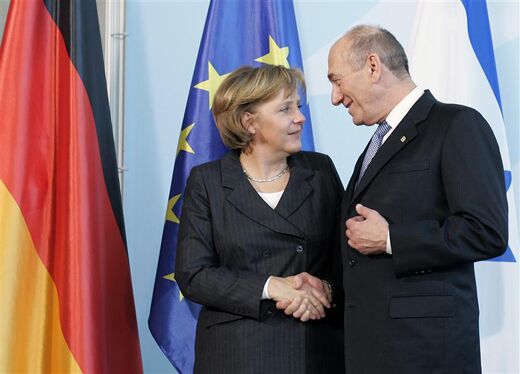
Europe Allies With Mideast States Over Iran
With America weakened and moderate Arabs clamoring to deal with the specter of an American withdrawal from Iraq, Europe sees an opening to secure its own interests in the Middle East. Not since the German Erwin Rommel’s Middle Eastern desert campaign during World War ii have Europe and Germany emerged with the potential to be such a powerful player in the region.
Since the Israel-Hezbollah war, Germany has dramatically escalated its involvement in the Middle East. Its foreign minister has visited the region several times. Since December 2006, German Chancellor Angela Merkel has held talks with Israeli Prime Minister Ehud Olmert, Palestinian Authority President Mahmoud Abbas, Jordan’s King Abdullah and Egyptian President Hosni Mubarak. Germany seeks to become a key communication and negotiating channel between regional players.
This growing German involvement is laying the groundwork for Europe to assume a controlling interest in the Middle East. One major reason for this has to do with what lies under the surface in the region: oil.
Energy supply is critical. European politicians know the power they have placed in Russia’s hands in terms of controlling the industrial, economic, and therefore political destiny of Europe. Germany, for instance—which has the largest economy in Europe and fifth largest in the world—imports over 90 percent of its oil, with a whopping 34 percent coming from Russia. The problem is, Russia has already fiddled with Europe’s energy taps twice, and the Continent faces the prospect of more political friction in the future. Europe realizes that its dependence on Russian energy is more than merely unpleasant—it is a threat to its viability. For Europe, the need to diversify away from Russian energy dependence is clear, and so too is the attractiveness of the Middle East.
To lay the political groundwork for its presence in the Middle East, Europe has two objectives, capitalizing on two emerging opportunities. First, it seeks to develop a political friendship with Israel while maneuvering into a prominent role in Israeli-Palestinian peace negotiations, and second, it wants to forge a political and economic relationship with moderate Arab states.
The first opportunity for Germany and Europe comes at the expense of a gradual American disengagement from Israel. Israeli Prime Minister Olmert has increasingly played down the U.S.’s role in the region and engaged German Chancellor Angela Merkel and the European Union for help in Israeli affairs. Thanks to Israel, Germany’s—and Europe’s—Middle East policy now has some real teeth.
The fruits of a German (European) relationship with Israel are becoming quite evident.
In Lebanon, Germany has deployed a regional naval force which is tasked under United Nations Security Council Resolution 1701 to secure the Lebanese coastline with up to 2,400 naval personnel. Additionally, a multi-national European task force is acting as a buffer between Israel and southern Lebanon, home to the radical Iranian-sponsored terror group Hezbollah. In the Gaza Strip, a group of Europeans monitors a volatile Egyptian-Gaza Strip border-crossing. Additionally, Germany has played an important back-channel role, negotiating on Israel’s behalf for soldiers kidnapped by Hezbollah.
Meanwhile, the difficulties Iran poses in the region have not gone unnoticed by Europe. When the energy interests of Europe are considered, a move on its part to align with anti-Iranian, moderate Arab seems a likely scenario.
Earlier this month, Chancellor Merkel toured the Middle East, discussing regional issues with Arab leaders. One issue under discussion, according to a February 6 Reuters report, was a free-trade zone between Gulf states and the European Union.
Talk of a free-trade zone between Germany and Gulf Cooperation Council (gcc) members began in the early ’90s, but withered on the vine because of irreconcilable differences. Now, it is back on the table. “There is a clear political desire on both sides to get a swift resolution to the disputed points,” a German official traveling with Merkel stated. Such a trade bloc might be a catalyst for jump-starting a European-gcc partnership.
Speaking to reporters from the gcc headquarters in Riyadh, Gulf Cooperation Council Secretary-General Abdul Rahman Al-Attiyah said that during his discussions with the visiting German chancellor he had called for a greater role for the European Union within the Middle East.
For the two power blocs—Europe and moderate Arabs—the relationship could become reciprocal. In exchange for oil imports, Europe could help moderate Arabs contain Iranian power.
Indeed, having cleverly side-stepped involvement in the Iraq war, Germany is in the box seat to lead the EU in significant diplomatic initiatives that affect the Middle East power equation.
Are we witnessing the outline of a new partnership within the Middle East—Europeans working with moderate Arabs to contain Iran? It is possible.
The Trumpet’s editor in chief, Gerald Flurry, has written about a mysterious alliance discussed in Psalm 83. According to biblical prophecy, two great power blocs are about to clash in the Middle East: the king of the north and the king of the south. Our booklets The King of the South and History and Prophecy of the Middle East offer detailed explanations of these prophecies.
In Psalm 83, after defeating the king of the south (an Iranian-led bloc), the king of the north (a European power) allies itself with several Middle Eastern nations, including the modern nations of Jordan and Saudi Arabia (in the psalm, the ancient biblical names of these countries are used). This alliance is prophesied to double-cross Israel, Britain and America.
God prophesied that this double-cross would happen in the last days prior to the return of Jesus Christ to rule the Earth. Are we getting closer to that reality? Men have long scoffed at the thought of the return of Jesus Christ in all power and glory. But Christ said to watch! He gave signs that could be identified which would help His people know when He was about to return. Are events in the Middle East today leading to that inspiring event? To answer these questions, order our free monthly magazine, the Philadelphia Trumpet.
